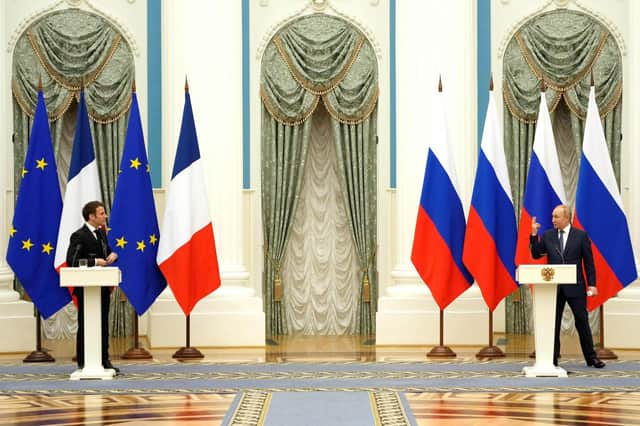Ukraine-Russia conflict: We need a lot more diplomacy before being sucked into talk of wider wars – Brian Wilson


I caught Nick Robinson on BBC Radio 4's Today programme asking the former Head of Something if our children and grandchildren should be preparing for the possibility of fighting a war. Absolutely, replied the military man. War with Russia was now a distinct possibility.
Hang on a minute, I thought. Even by the standards of these strange times, it was a startling response to a question that would not have been asked a week ago. It reinforced the need for more talk of diplomacy and peace-making at this time, rather than being sucked into doomsday scenarios.
Advertisement
Hide AdAdvertisement
Hide AdPutin’s invasion of Ukraine is deplorable by any standard and the product of a long-festering grievance. But is subordination of Ukraine to Russia’s sphere of influence an end in itself or the prelude to some grander design to dominate eastern Europe, just like the old days?
There is a danger in assuming the latter, just as there was danger in failing to recognise long ago the threat implicit in not addressing Russia’s concerns about Nato membership advancing steadily towards its borders. The mantra that Ukraine is free to join whatever alliance it likes was never an adequate response.
The question of sending Nato troops does not arise because Ukraine is not a member of the alliance. If anything similar happened in the Baltic States, there would be an obligation for Nato to act, having signed these countries up, complete with the Article 5 commitment which holds an attack on one to be an attack on all.
These guarantees were liberally offered at a time when Russia was a beaten country – politically, economically and militarily. A lot has changed in 30 years, however, and those who warned that the relentless push to extend Nato eastwards would eventually bring a Russian response have now been proven right, in the grimmest of circumstances.
This debate has gone on virtually since the break-up of the Soviet Union and the Russian case is that promises made at that time that Nato would not expand eastwards have repeatedly been broken. That may be a rationale for aggression against Ukraine, rather than the true reason, but it is a critical point of dispute which has long cried out to be addressed through diplomacy.
The Americans under President Clinton were particularly bullish about Nato expansion, first by embracing former Warsaw Pact states before moving onto the Baltic states – Estonia, Lithuania and Latvia – that had moved comfortably out of the Soviet era towards links with western Europe.
Maybe Russia would have lived with all of that. However, there has been longstanding notice that a line was crossed in Putin’s eyes when Nato indicated that Georgia and Ukraine were also prospective members.
In 2008, Putin said: “No Russian leader could stand idly by in the face of steps toward Nato membership for Ukraine. That would be a hostile act towards Russia.” You can’t get much more explicit than that.
Advertisement
Hide AdAdvertisement
Hide AdYet the option has lingered. There is irony in the fact that Nato will not defend Ukraine because it is not a member while, arguably, the whole conflict could have been avoided through a clear statement that Ukraine would not become one in future. It is difficult to see what would have been lost by that, relative to the horrors now unfolding.
There is nothing to commend the regime Putin presides over and there will be many millions in Russia who are utterly opposed to waging a war of invasion against people with whom they have so much in common through history and culture. It is beyond reason that Putin invokes that shared heritage as grounds for bombing the very people who personify it.
However, it is a first rule of diplomacy that personalities must not block the road to negotiation. Revulsion alone cannot eliminate the possibility there is a genuine issue to resolve. Before anyone starts talking about sending our children and grandchildren to war, diplomacy has a long way to run.
A message from the Editor:
Thank you for reading this article. We're more reliant on your support than ever as the shift in consumer habits brought about by coronavirus impacts our advertisers.
If you haven't already, please consider supporting our trusted, fact-checked journalism by taking out a digital subscription.
Comments
Want to join the conversation? Please or to comment on this article.

